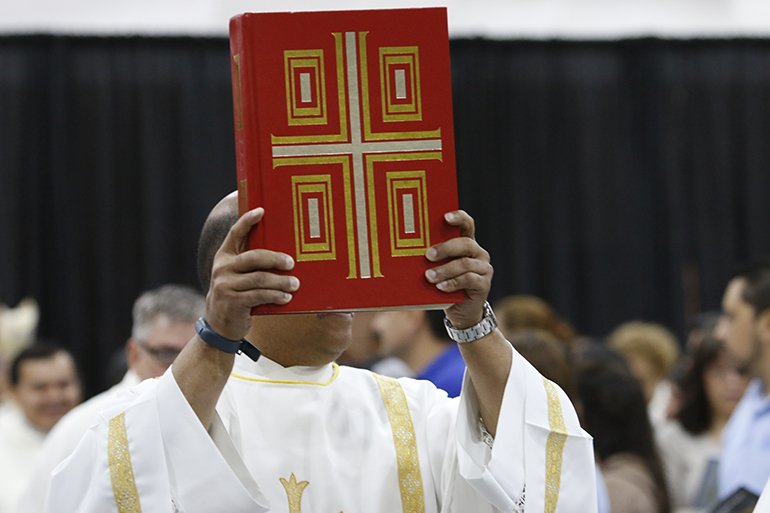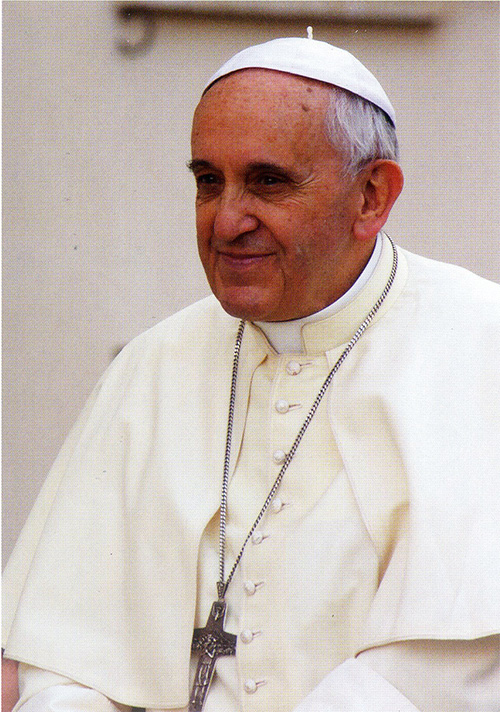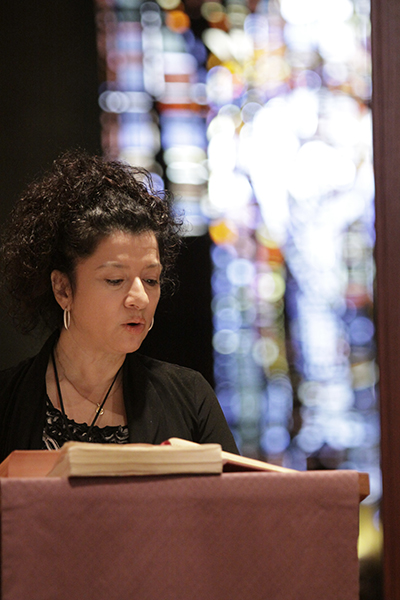By Catholic News Agency - Catholic News Agency

Photographer: ANA RODRIGUEZ-SOTO | FC
Pope Francis, in proclaiming the Sunday of the Word of God, suggested parishes should highlight the “proclamation of the word of the Lord and emphasize in the homily the honor that it is due.” In this file photo, Deacon Pierre Douyon of St. Maximilian Kolbe Parish in Pembroke Pines carries the Book of the Gospels during Mass.
VATICAN CITY | Pope Francis has declared the Third Sunday in Ordinary Time to be the Sunday of the Word of God in order to promote a closer relationship with holy scripture and its dissemination in the world.
“A day devoted to the Bible should not be seen as a yearly event but rather a year-long event, for we urgently need to grow in our knowledge and love of the Scriptures and of the risen Lord,” the pope wrote in an apostolic letter Sept. 30.

Photographer: Daniele Cataldi | Demotix | Corb
“A day devoted to the Bible should not be seen as a yearly event but rather a year-long event, for we urgently need to grow in our knowledge and love of the Scriptures and of the risen Lord,” the pope wrote in an apostolic letter Sept. 30.
“For this reason, we need to develop a closer relationship with sacred Scripture; otherwise, our hearts will remain cold and our eyes shut, struck as we are by so many forms of blindness.”
He said, “the Bible is not a collection of history books or a chronicle, but is aimed entirely at the integral salvation of the person.”
Pope Francis instituted the special day for celebrating the Word of God in the Church with the promulgation motu proprio of the apostolic letter Aperuit Illis, published Sept. 30, 2019, the 1,600th anniversary of St. Jerome’s death and his feast day.
The Third Sunday in Ordinary Time, on the Roman calendar, typically falls around the end of January.
In Aperuit Illis, Pope Francis said Catholics should keep in mind God’s teaching in the Book of Revelation: that the Lord is standing at the door and knocking. “Christ Jesus is knocking at our door in the words of sacred Scripture. If we hear his voice and open the doors of our minds and hearts, then he will enter our lives and remain ever with us,” he said.
“The Bible,” he noted, “cannot be just the heritage of some, much less a collection of books for the benefit of a privileged few. It belongs above all to those called to hear its message and to recognize themselves in its words.”
BOOK OF GOD’S PEOPLE
“The Bible is the book of the Lord’s people, who, in listening to it, move from dispersion and division towards unity. The word of God unites believers and makes them one people,” he stated.
The pope also explained that there is an ecumenical value to the celebration of the Sunday of the Word of God, since “the Scriptures point out, for those who listen, the path to authentic and firm unity.”
Each community can decide how to mark the Sunday of the Word of God, but it is important, he said, that sacred scripture be “enthroned.”
He said one example of how to do this would be to highlight the “proclamation of the word of the Lord and to emphasize in the homily the honor that it is due.”
Other examples he gave were for pastors to give out Bibles or a book of the Bible to encourage daily prayer with sacred scripture, such as lectio divina, or for bishops to celebrate the Rite of Installation of Lectors that day. He added that this is a good opportunity for parishes to renew their efforts to train lectors to be “genuine proclaimers of the word.”
ROLE OF PASTORS
Francis spoke about the role of pastors, who, he said, have the responsibility of explaining sacred scripture and helping their parishioners understand it, especially through the homily, which possesses, as it says in Evangelii Gaudium, “a quasi-sacramental character.”
“Helping people to enter more deeply into the word of God through simple and suitable language,” he emphasized, “is a pastoral opportunity that should not be wasted!”
For many Catholics, Francis said, this may be the only time they encounter the beauty of God’s word and see it applied to their lives, therefore the homily must be prepared carefully and with sufficient time: “A commentary on the sacred readings cannot be improvised.”

Photographer: ANA RODRIGUEZ-SOTO | FC
Pope Francis said the Sunday of the Word of God is a good opportunity for parishes to renew their efforts to train lectors to be “genuine proclaimers of the word.” In this file photo, Marta Vargas proclaims a reading during a Mass at the archdiocesan Pastoral Center.
He also advised against “long, pedantic homilies,” or wandering into unrelated topics: “When we take time to pray and meditate on the sacred text, we can speak from the heart and thus reach the hearts of those who hear us, conveying what is essential and capable of bearing fruit.”
Catechists should also renew themselves and their ministry through personal study of sacred scripture, he added.
The pope referenced at length the Second Vatican Council dogmatic constitution Dei Verbum.
“The Constitution clearly expounds the nature of sacred Scripture, its transmission from generation to generation (Chapter II), its divine inspiration (Chapter III), embracing the Old and New Testaments (Chapters IV and V), and the importance of Scripture for the life of the Church (Chapter VI),” he explained.
Francis also noted Benedict XVI’s convocation, in 2008, of a synod of bishops on “The Word of God in the Life and Mission of the Church,” and the pope emeritus’ apostolic exhortation Verbum Domini, “whose teaching remains fundamental for our communities.”
Verbum Domini “emphasizes the Scriptures’ saving purpose, spiritual dimension and inherent incarnational principle,” he said.
Dei Verbum says, “we frequently risk separating sacred Scripture and sacred Tradition, without understanding that together they are the one source of Revelation,” Pope Francis commented.
“The written character of the former takes nothing away from its being fully a living word; in the same way, the Church’s living Tradition, which continually hands that word down over the centuries from one generation to the next, possesses that sacred book as the ‘supreme rule of her faith,’” he said.

